The Alchemist of Souls (Night's Masque Series #1)
 An impeccably-researched alt-history set late in Queen Elizabeth I's reign.In this world there are two main points of difference. Elizabeth married and bore two sons, and there is a race of people called "skraylings" who come from Vinland (Newfoundland). Presumably this is a play on 'skraeling', which is what the Norse called Greenland and Vinland's Native Americans, although this book's skraelings are non-humans with fangs and vestigial tails. England has an important alliance with (the main clan of) the skraylings.The plot revolves around three people. Mal, who has been specifically requested as a bodyguard by the skrayling ambassador. Coby, a girl-dressed-as-a-boy working for a theater company. And Ned, Mal's good friend. Many plots begin revolving around Mal after his appointment, and Coby and Ned are drawn into them in his wake. Things are far more complex than any of them realise.The story very successfully conjures the uncertainty and powerlessness of the landless and poor during Elizabethan times, and the culmination of the story is quite interesting, but I kept putting the book down and not picking it up, so I guess overall it didn't click with me.A couple of things which made me a little uncomfortable were the use of an actual-world word for Native Americans for a non-human race, and the general womanlessness of this world. There are quite a few incidental women in the story, but Coby is the only one who matters enough to be a person to the reader (and she's basically 'the helpful love interest', while Mal is the person who is the interesting/important one). Even the Queen is off-scene and not directly involved in much of the story.At any rate, I think this is a solidly-told story, which just didn't click enough with me.
An impeccably-researched alt-history set late in Queen Elizabeth I's reign.In this world there are two main points of difference. Elizabeth married and bore two sons, and there is a race of people called "skraylings" who come from Vinland (Newfoundland). Presumably this is a play on 'skraeling', which is what the Norse called Greenland and Vinland's Native Americans, although this book's skraelings are non-humans with fangs and vestigial tails. England has an important alliance with (the main clan of) the skraylings.The plot revolves around three people. Mal, who has been specifically requested as a bodyguard by the skrayling ambassador. Coby, a girl-dressed-as-a-boy working for a theater company. And Ned, Mal's good friend. Many plots begin revolving around Mal after his appointment, and Coby and Ned are drawn into them in his wake. Things are far more complex than any of them realise.The story very successfully conjures the uncertainty and powerlessness of the landless and poor during Elizabethan times, and the culmination of the story is quite interesting, but I kept putting the book down and not picking it up, so I guess overall it didn't click with me.A couple of things which made me a little uncomfortable were the use of an actual-world word for Native Americans for a non-human race, and the general womanlessness of this world. There are quite a few incidental women in the story, but Coby is the only one who matters enough to be a person to the reader (and she's basically 'the helpful love interest', while Mal is the person who is the interesting/important one). Even the Queen is off-scene and not directly involved in much of the story.At any rate, I think this is a solidly-told story, which just didn't click enough with me.
They Came to Baghdad
 One of Christie's more successful spy stories. Published not long after World War II, shades of Hitler's ideas hang over the story, and the plot again involves a young woman becoming entangled in espionage. Victoria Jones is a not very good typist, but an excellent liar, and she's definitely an active go-getter: determining her goals and acting. The question of her level of intelligence is inconsistent, but I think it's best considered that she has been held back somewhat by a lack of a good education.Quite a few coincidences involved, but an enjoyable story.
One of Christie's more successful spy stories. Published not long after World War II, shades of Hitler's ideas hang over the story, and the plot again involves a young woman becoming entangled in espionage. Victoria Jones is a not very good typist, but an excellent liar, and she's definitely an active go-getter: determining her goals and acting. The question of her level of intelligence is inconsistent, but I think it's best considered that she has been held back somewhat by a lack of a good education.Quite a few coincidences involved, but an enjoyable story.
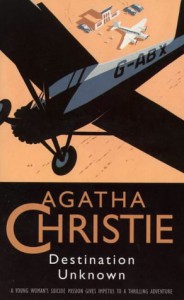 Vastly more spy story than mystery, "Destination Unknown" revolves around the disappearance of scientists during the early Cold War era. Have they defected? Will the young wife of one of the scientists lead the government to him?As is typical for many of Christie's spy-oriented story, this one revolves around an innocent passerby, Hilary Craven, who is brought into the story by circumstances.It's a fairly slight book, perhaps more a chance to hold up some of the "brave new world" ideas that may have been going around at the time rather than any single driving plot. So, not bad, but not an urgently compelling read.
Vastly more spy story than mystery, "Destination Unknown" revolves around the disappearance of scientists during the early Cold War era. Have they defected? Will the young wife of one of the scientists lead the government to him?As is typical for many of Christie's spy-oriented story, this one revolves around an innocent passerby, Hilary Craven, who is brought into the story by circumstances.It's a fairly slight book, perhaps more a chance to hold up some of the "brave new world" ideas that may have been going around at the time rather than any single driving plot. So, not bad, but not an urgently compelling read.
 This volume started out a little slow for me, but I ended up thoroughly enjoying it. These are by no means fast-paced action tales, but instead domestic slice of life (in a fantasy castle) combined with back story of the various characters.I really disliked the epilogue, though. Terrible interpretation of Snow White..
This volume started out a little slow for me, but I ended up thoroughly enjoying it. These are by no means fast-paced action tales, but instead domestic slice of life (in a fantasy castle) combined with back story of the various characters.I really disliked the epilogue, though. Terrible interpretation of Snow White..
Hunting
 "Hunting" was written in response to my extreme frustration with [a:Georgette Heyer|18067|Georgette Heyer|http://d.gr-assets.com/authors/1336748892p2/18067.jpg]'s [b:Regency Buck|311127|Regency Buck|Georgette Heyer|http://d.gr-assets.com/books/1298500902s/311127.jpg|9667210]. Much as I love Heyer's books, on occasion she takes a promising young lady, and just...foils her at every turn. My need for a heroine capable of getting herself out of her own scrapes produced Ash Lenthard, who does not so much kick ass, as tap-dance across the heads of her enemies...
"Hunting" was written in response to my extreme frustration with [a:Georgette Heyer|18067|Georgette Heyer|http://d.gr-assets.com/authors/1336748892p2/18067.jpg]'s [b:Regency Buck|311127|Regency Buck|Georgette Heyer|http://d.gr-assets.com/books/1298500902s/311127.jpg|9667210]. Much as I love Heyer's books, on occasion she takes a promising young lady, and just...foils her at every turn. My need for a heroine capable of getting herself out of her own scrapes produced Ash Lenthard, who does not so much kick ass, as tap-dance across the heads of her enemies...
Kat, Incorrigible
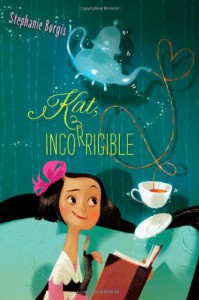 I passed over this previously because it wasn't available to me in my preferred format (for some reason so many publishers don't sell ebooks to Australians). However, it sounds like an interesting book, and I hate to see authors becoming the collateral damage of spats between corporations, so definitely worth a re-think!
I passed over this previously because it wasn't available to me in my preferred format (for some reason so many publishers don't sell ebooks to Australians). However, it sounds like an interesting book, and I hate to see authors becoming the collateral damage of spats between corporations, so definitely worth a re-think!
The Hero's Guide to Saving Your Kingdom
 Comedic story for the younger set. It seemed well written, but sadly wasn't my style of humour, and I kept not supporting the various romances. The characters were a little too broadly drawn for my tastes.
Comedic story for the younger set. It seemed well written, but sadly wasn't my style of humour, and I kept not supporting the various romances. The characters were a little too broadly drawn for my tastes.
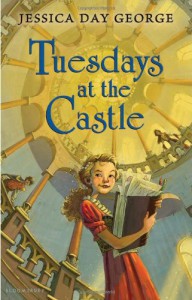 Sweet story of girl and her good friend the living castle. Strong opening, a little less strong at the end, but still very readable. Never did understand why the castle couldn't just eject the problem, though. It seemed quite capable of doing plenty of other things, suppressed or not.Aimed more toward the younger end of middle grade, with many characters being broad rather than realistic.
Sweet story of girl and her good friend the living castle. Strong opening, a little less strong at the end, but still very readable. Never did understand why the castle couldn't just eject the problem, though. It seemed quite capable of doing plenty of other things, suppressed or not.Aimed more toward the younger end of middle grade, with many characters being broad rather than realistic.
 Short stories all seemed to be on the theme of controlling the politico-historical dialogue.The Weight of a Blessing by Aliette de Bodard - a mother visits her daughter before she's sentenced to deportation to another planet. Daughter is a 'terrorist' who caused a colonialist monument to display a truer attitude of the colonised toward the victors.The Last Survivor of the Great Sexbot Revolution by A C Wise - Once sexbots were ubiquitous, then they were almost all gone. Many different versions of why are presented (I frowned and wondered how such disparate 'truths' could be given any credence in a technological world, but perhaps that was the point).86, 87, 88, 89 by Genevieve Valentine - archivists collect any written evidence following an incident of domestic terrorism in a dictatorial New York.Videodrome at Thirty by Keith Phipps: talking about a movie I haven't seen. :)Accepting a More Profitable Shoe: A Conversation with M. C. Planck by Jeremy L C Jones: talking about a book I haven't read. :)Another Word: Original Sin by Alethea Kontis - discusses the softening of fairytales, and then current tastes in fantasy.
Short stories all seemed to be on the theme of controlling the politico-historical dialogue.The Weight of a Blessing by Aliette de Bodard - a mother visits her daughter before she's sentenced to deportation to another planet. Daughter is a 'terrorist' who caused a colonialist monument to display a truer attitude of the colonised toward the victors.The Last Survivor of the Great Sexbot Revolution by A C Wise - Once sexbots were ubiquitous, then they were almost all gone. Many different versions of why are presented (I frowned and wondered how such disparate 'truths' could be given any credence in a technological world, but perhaps that was the point).86, 87, 88, 89 by Genevieve Valentine - archivists collect any written evidence following an incident of domestic terrorism in a dictatorial New York.Videodrome at Thirty by Keith Phipps: talking about a movie I haven't seen. :)Accepting a More Profitable Shoe: A Conversation with M. C. Planck by Jeremy L C Jones: talking about a book I haven't read. :)Another Word: Original Sin by Alethea Kontis - discusses the softening of fairytales, and then current tastes in fantasy.
14
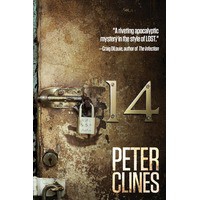 Any "weird house" story usually falls into two parts: the slow unravelling of weirdness, and the action at the end, where the characters have figured out what's going on and are either trying to survive or escape. '14' is no exception to this rule, and like most of these books, the mystery is far more interesting than the final section.The cover suggests the book is horror, and it is, in its way, but it's more weird science. The characters are semi-reasonable, though with one dreadfully predictable stereotype, and there's at least one character who could be entirely cut from the plot and it would make no difference whatsoever. There's also a bit of incipient and pointless rivalry between the two 'main females' which expressed itself in bitch/slut snark, which was tiresome and seemed to serve no purpose given where the relationships went.You also wouldn't want to be over a certain age in this book - you're clearly there to be killed without really being that big a loss.A big peppering of geeky book and movie references to round the story out, and a solid dose of "you stupid people - there was a point where you should have stopped poking around and you didn't".
Any "weird house" story usually falls into two parts: the slow unravelling of weirdness, and the action at the end, where the characters have figured out what's going on and are either trying to survive or escape. '14' is no exception to this rule, and like most of these books, the mystery is far more interesting than the final section.The cover suggests the book is horror, and it is, in its way, but it's more weird science. The characters are semi-reasonable, though with one dreadfully predictable stereotype, and there's at least one character who could be entirely cut from the plot and it would make no difference whatsoever. There's also a bit of incipient and pointless rivalry between the two 'main females' which expressed itself in bitch/slut snark, which was tiresome and seemed to serve no purpose given where the relationships went.You also wouldn't want to be over a certain age in this book - you're clearly there to be killed without really being that big a loss.A big peppering of geeky book and movie references to round the story out, and a solid dose of "you stupid people - there was a point where you should have stopped poking around and you didn't".
 One of those books which divide me in response. "Ordinary Magic" has a lot going for it - it's fast-paced with a fascinating premise, a really strong sense of place and a more-ish voice. I think a lot of people would like it.However, I found the huge amount of snappy patter conversation a bit like wandering onto the set of a Marx Brothers movie, and as I read, I kept being niggled to death by issues with the world-building.This is a world full to the brim with magic. Everyone uses magic for everything - food is conjured, magic carpets are the main mode of transportation, prisons have magical doors - even the showers are turned on and off with magic. And a tiny percentage of the population is born with no magic at all - Ords. They can't use magic and magic can't be worked on them.At the age of 12, all children are officially tested on their level of magic. Before that they're not allowed to try and use it, and they're not allowed to have it used on them. Which I guess means for the first twelve years of their life, children must be having someone else turn the shower on and off for them and (given the way everything else depends on magic) presumably someone flushes the toilet for them too. This age testing thing makes little to no sense given the sheer ubiquity and reliance on magic in this world - let alone the likelihood of any child refraining from trying to use magic for 12 whole years. It's simply a device to have a big dramatic judging, life-changed-forever start to the novel.And dramatic it is, since upon being judged an Ord, the child is apparently completely dropped from society, ostracised, treated as non-human and hated and feared.The hatred was given little foundation and was particularly difficult to believe in. Ords are demonstrably not 'contagious' and live completely mildly in society for 12 years and then suddenly are apparently frightening? What are they going to do that they haven't been doing in the previous 12 years? The negative attitude toward Ords is so complete that almost all families abandon their children or want nothing to do with them, they are referred to as "It", addressed only as "Ord" and sold to adventurers as useful trap-clearing tools. [At least until King Steve came along and started trying to change this.]Main character Abby is slightly different in that her family is deep-down nice and refuse to stop loving her. This (perfectly normal) reaction is apparently so unusual that when Abby goes to Ord-school, the other students resent her for having a family that doesn't hate her. While overall Abby comes across as an extrovert and occasional chatterbox, she also has a touch of virtuous martyr about her (seen both in this attitude toward her in school, her wanting to share her room because of trouble sleeping but not actually telling anyone, and most especially the weird victimisation of Abby by the cook which seemed to occur purely so Abby could stoically refuse to complain about it or resent it).[I was also very confused as to why Ord school doesn't seem to have any general lessons on cooking, cleaning, sewing - all the things that other people do by magic which Ords will need to accomplish the hard way. Instead they get the standard history, maths, etc, plus self-defence, running away, and magic identification classes.]Anyway - a very readable story which I wasn't able to fully enjoy because I was distracted by the world building.
One of those books which divide me in response. "Ordinary Magic" has a lot going for it - it's fast-paced with a fascinating premise, a really strong sense of place and a more-ish voice. I think a lot of people would like it.However, I found the huge amount of snappy patter conversation a bit like wandering onto the set of a Marx Brothers movie, and as I read, I kept being niggled to death by issues with the world-building.This is a world full to the brim with magic. Everyone uses magic for everything - food is conjured, magic carpets are the main mode of transportation, prisons have magical doors - even the showers are turned on and off with magic. And a tiny percentage of the population is born with no magic at all - Ords. They can't use magic and magic can't be worked on them.At the age of 12, all children are officially tested on their level of magic. Before that they're not allowed to try and use it, and they're not allowed to have it used on them. Which I guess means for the first twelve years of their life, children must be having someone else turn the shower on and off for them and (given the way everything else depends on magic) presumably someone flushes the toilet for them too. This age testing thing makes little to no sense given the sheer ubiquity and reliance on magic in this world - let alone the likelihood of any child refraining from trying to use magic for 12 whole years. It's simply a device to have a big dramatic judging, life-changed-forever start to the novel.And dramatic it is, since upon being judged an Ord, the child is apparently completely dropped from society, ostracised, treated as non-human and hated and feared.The hatred was given little foundation and was particularly difficult to believe in. Ords are demonstrably not 'contagious' and live completely mildly in society for 12 years and then suddenly are apparently frightening? What are they going to do that they haven't been doing in the previous 12 years? The negative attitude toward Ords is so complete that almost all families abandon their children or want nothing to do with them, they are referred to as "It", addressed only as "Ord" and sold to adventurers as useful trap-clearing tools. [At least until King Steve came along and started trying to change this.]Main character Abby is slightly different in that her family is deep-down nice and refuse to stop loving her. This (perfectly normal) reaction is apparently so unusual that when Abby goes to Ord-school, the other students resent her for having a family that doesn't hate her. While overall Abby comes across as an extrovert and occasional chatterbox, she also has a touch of virtuous martyr about her (seen both in this attitude toward her in school, her wanting to share her room because of trouble sleeping but not actually telling anyone, and most especially the weird victimisation of Abby by the cook which seemed to occur purely so Abby could stoically refuse to complain about it or resent it).[I was also very confused as to why Ord school doesn't seem to have any general lessons on cooking, cleaning, sewing - all the things that other people do by magic which Ords will need to accomplish the hard way. Instead they get the standard history, maths, etc, plus self-defence, running away, and magic identification classes.]Anyway - a very readable story which I wasn't able to fully enjoy because I was distracted by the world building.
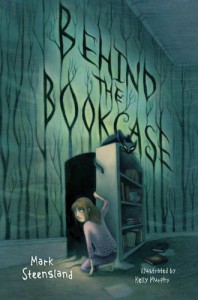 This sit on the younger end of middle grade fiction, with straightforward prose and a plot revolving around weird creatures and travel. I suspect I'm just too far out of the age group for this one, and that it would do nicely for the 8-10s.
This sit on the younger end of middle grade fiction, with straightforward prose and a plot revolving around weird creatures and travel. I suspect I'm just too far out of the age group for this one, and that it would do nicely for the 8-10s.
 Fourth in what looks to be a five-book series, the plot has more than hit its stride, as past and present paranormal investigations complicate Ursula Formosa's life - and significantly lower her chances of survival. Fortunately she has long since stopped denying her own psychic abilities and is step by step learning how to put them to use.Continuing to enjoy this a lot and looking forward to seeing how the story climaxes.The series should have a warning for food porn, however. So many delicious meals I'm in the wrong country to try.
Fourth in what looks to be a five-book series, the plot has more than hit its stride, as past and present paranormal investigations complicate Ursula Formosa's life - and significantly lower her chances of survival. Fortunately she has long since stopped denying her own psychic abilities and is step by step learning how to put them to use.Continuing to enjoy this a lot and looking forward to seeing how the story climaxes.The series should have a warning for food porn, however. So many delicious meals I'm in the wrong country to try.
 A crashed ship and corporate espionage. Not an action-filled story, and no romantic arc (the main character is already in a committed relationship) - simply an engrossing, relaxed-pace mystery about a professional salvage team.Always interesting to read SF written before the internet and mobile phones really got going. Very funny the number of times people printed things out in this future world.
A crashed ship and corporate espionage. Not an action-filled story, and no romantic arc (the main character is already in a committed relationship) - simply an engrossing, relaxed-pace mystery about a professional salvage team.Always interesting to read SF written before the internet and mobile phones really got going. Very funny the number of times people printed things out in this future world.
The Adventures of Superhero Girl
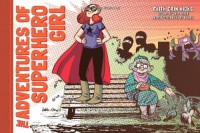 Does Superman's cape ever shrink in the wash?This is the story of a superhero girl, with no official name, not much of a costume, and not even an arch nemisis to call her own.Wryly humorous and sweet, I read this first in webcomic form, and liked it enough to pick up coloured versions in print. I hope she comes back to this story one day.
Does Superman's cape ever shrink in the wash?This is the story of a superhero girl, with no official name, not much of a costume, and not even an arch nemisis to call her own.Wryly humorous and sweet, I read this first in webcomic form, and liked it enough to pick up coloured versions in print. I hope she comes back to this story one day.
Gaudy Night (Lord Peter Wimsey Mysteries)
 I hereby dub this review: "In need of a good stupping".This is the second mystery that Harriet and Peter investigate 'together' – and by together I mean that Harriet spends quite a time collecting facts, and Peter does all the analysis and deduction. Indeed, he spots the culprit almost immediate on reading the evidence, quickly takes steps to verify it, and does what he can to obtain what little proof is possible.The primary question of the book is women – intellectual women particularly – and their need, or not, for sex and marriage. Something at the forefront of Harriet's mind because the wounds of her disastrous first love have more or less healed over, and she now is beginning to face up to the question of an extremely suitable man who for the last five years has been asking her to marry him. She likes Peter, but has not quite connected to him as an attractive male, and considers herself weighed down and burdened by her debt to him – while also strongly and powerfully believing that she herself is "spoiled" – publicly known to not be a virgin and thus not suitable marriage material.Gaudy Night opens with Harriet Vane returning to Oxford, giving us the equivalent of a high school reunion, as Harriet looks back with rose coloured eyes on happy student days, and offers up a romanticised picture of Oxford scholars as unworldly and devoted to nothing but the highest of intellectual ideals. Most of the female scholars are representative of types – the woman who has married and let her mind decay while she devotes herself to children. The virgin spinster who hates men. The woman passionately devoted to a cause. The pure intellectual. The rare successful marriage where intellectual pursuit and family devotion have been melded in a complementary match.Harriet's opinions of the other female scholars are a trifle off-putting, particularly her immediate cringing away from the friend she has gone there to meet, who has allowed her intellect to stagnate in the favour of children, and of another who is "not smart enough" on two levels. Female scholars without fine minds and who are not fine clothes horses are definitely depicted as lesser in this book. Harriet is also of the opinion (commonly held at the time) that lady-bits denied a thorough stupping are prone to spoil, and the vinegar of their decay is liable to rise up to sour and distort their owner's thought processes.This particular thesis is played out in the character of Miss Hillyard, the "man-hating" character. Frankly, I have little issue with ladies living in the 1930s who think men receive great privileges that women do not, and so are inclined to be resentful and sarcastic about it. Harriet, however, thinks Miss Hillyard is 'potty', that there's definitely something gone wrong with her, and puts it down to a lack of stupping. [Note: Harriet doesn't use quite the same terms.] I was amused when Peter told Harriet she's suffering from a bias because of her own preoccupations about sex. I was less amused at the inevitable fate of man-hating spinsters who meet god-like beings such as Peter Wimsey.Although Peter and Harriet are clearly well-suited to each other, and it's obvious to the reader that they'll be happy if they manage to get together, it's only in the final pages of the book that I can manage to bring myself to fully enjoy the romance – because Peter apologises for the rush of his pursuit, so tactlessly commenced while she's still on trial for the murder of her lover. In these final speeches it's clear that Peter has had to face up to the wrongness – indeed, the cruelty – of that action, just as Harriet has had to both heal, and regain her courage. And during the book Peter has proved that he is capable of not "annexing" her – that theirs is to be a marriage of love and mutual support, with space given for their different interests and no expectation that Harriet become merely an obedient extension of him.It is most certainly not a marriage of equals. Peter is superior to Harriet in every single way. Socially, financially, physically, intellectually, emotionally, morally. He unravels in a day the problem she has worked on for months. He tells her how to fix the novel she's writing. He completes the poem she's writing – but does it better. He faces his emotions and deliberately changes himself to better himself. The setting of Oxford, where they can both be just two scholars together, making it possible for them to be on equal footing and reach an accord, is somewhat undercut for me because Wimsey has just proved himself utterly superior to every single female scholar present – again both intellectually and morally, as well as on the social level of an extremely eligible bachelor in the spinster house.All of this sounds like I hate the book, which is not quite correct. It's an engrossing mystery, and as much as any reader I want Harriet to work through her issues and find a way to be happy. And it is a writer in the 1930s trying to wrestle with the major question of being an intellectual woman.I just prefer a little more equality in my romances, and hope for female scholar-mystery writers to occasionally be the one who makes the deductions.
I hereby dub this review: "In need of a good stupping".This is the second mystery that Harriet and Peter investigate 'together' – and by together I mean that Harriet spends quite a time collecting facts, and Peter does all the analysis and deduction. Indeed, he spots the culprit almost immediate on reading the evidence, quickly takes steps to verify it, and does what he can to obtain what little proof is possible.The primary question of the book is women – intellectual women particularly – and their need, or not, for sex and marriage. Something at the forefront of Harriet's mind because the wounds of her disastrous first love have more or less healed over, and she now is beginning to face up to the question of an extremely suitable man who for the last five years has been asking her to marry him. She likes Peter, but has not quite connected to him as an attractive male, and considers herself weighed down and burdened by her debt to him – while also strongly and powerfully believing that she herself is "spoiled" – publicly known to not be a virgin and thus not suitable marriage material.Gaudy Night opens with Harriet Vane returning to Oxford, giving us the equivalent of a high school reunion, as Harriet looks back with rose coloured eyes on happy student days, and offers up a romanticised picture of Oxford scholars as unworldly and devoted to nothing but the highest of intellectual ideals. Most of the female scholars are representative of types – the woman who has married and let her mind decay while she devotes herself to children. The virgin spinster who hates men. The woman passionately devoted to a cause. The pure intellectual. The rare successful marriage where intellectual pursuit and family devotion have been melded in a complementary match.Harriet's opinions of the other female scholars are a trifle off-putting, particularly her immediate cringing away from the friend she has gone there to meet, who has allowed her intellect to stagnate in the favour of children, and of another who is "not smart enough" on two levels. Female scholars without fine minds and who are not fine clothes horses are definitely depicted as lesser in this book. Harriet is also of the opinion (commonly held at the time) that lady-bits denied a thorough stupping are prone to spoil, and the vinegar of their decay is liable to rise up to sour and distort their owner's thought processes.This particular thesis is played out in the character of Miss Hillyard, the "man-hating" character. Frankly, I have little issue with ladies living in the 1930s who think men receive great privileges that women do not, and so are inclined to be resentful and sarcastic about it. Harriet, however, thinks Miss Hillyard is 'potty', that there's definitely something gone wrong with her, and puts it down to a lack of stupping. [Note: Harriet doesn't use quite the same terms.] I was amused when Peter told Harriet she's suffering from a bias because of her own preoccupations about sex. I was less amused at the inevitable fate of man-hating spinsters who meet god-like beings such as Peter Wimsey.Although Peter and Harriet are clearly well-suited to each other, and it's obvious to the reader that they'll be happy if they manage to get together, it's only in the final pages of the book that I can manage to bring myself to fully enjoy the romance – because Peter apologises for the rush of his pursuit, so tactlessly commenced while she's still on trial for the murder of her lover. In these final speeches it's clear that Peter has had to face up to the wrongness – indeed, the cruelty – of that action, just as Harriet has had to both heal, and regain her courage. And during the book Peter has proved that he is capable of not "annexing" her – that theirs is to be a marriage of love and mutual support, with space given for their different interests and no expectation that Harriet become merely an obedient extension of him.It is most certainly not a marriage of equals. Peter is superior to Harriet in every single way. Socially, financially, physically, intellectually, emotionally, morally. He unravels in a day the problem she has worked on for months. He tells her how to fix the novel she's writing. He completes the poem she's writing – but does it better. He faces his emotions and deliberately changes himself to better himself. The setting of Oxford, where they can both be just two scholars together, making it possible for them to be on equal footing and reach an accord, is somewhat undercut for me because Wimsey has just proved himself utterly superior to every single female scholar present – again both intellectually and morally, as well as on the social level of an extremely eligible bachelor in the spinster house.All of this sounds like I hate the book, which is not quite correct. It's an engrossing mystery, and as much as any reader I want Harriet to work through her issues and find a way to be happy. And it is a writer in the 1930s trying to wrestle with the major question of being an intellectual woman.I just prefer a little more equality in my romances, and hope for female scholar-mystery writers to occasionally be the one who makes the deductions.


